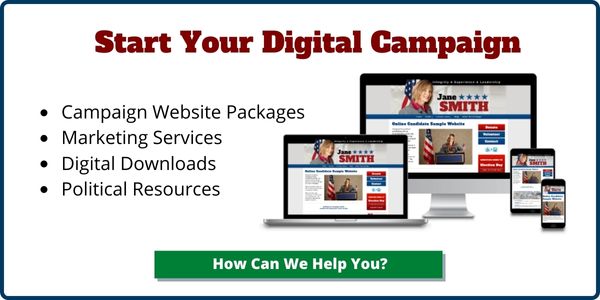What To Do With Your Campaign Website After The Election
The election is over. As a candidate, you’ve either won or lost. All the advertising has ended, the final bills are paid, and the signage comes down. But don’t forget the campaign website – it’s still out there! Here are some ideas for dealing with your website after Election Day.
Make a final update
No matter what you do, you should post a final election update to your website. Won or lost, your home page should acknowledge the results. Thank your friends and supporters for their help – they deserve it.
If you have a domain name that is year based (electsmith2020.com), you should keep the website up for a few months, or until the end of your hosting period. You site may still get traffic from those interested in the outcome of the election or what is happening with the candidate. With a date-based name, odds are you won’t use that same name/website again.
If you have a name that is position or name based (smithforsupervisor.com or joesmith.com), consider the long-term benefits of keeping the site active until the next campaign vs shutting the site down completely. Even if you have a domain name that is date-specific, you can still keep your existing website, but just change the site’s domain name. (We can do that for you.)
Keep the campaign alive
To keep volunteers and fundraisers available and in the loop, elected officials and PACs should never truly shut down their campaign organizations. You may want to shut down certain pages or sections of the campaign website, but continue to run the site with relevant news and event updates. In other words, if you are planning on running again, use the site to keep the interest alive until the next campaign.
Keeping the site active also gives you a head start when it comes to fundraising for the next campaign. Having supporters already in the loop will make it easier to get them involved again when you need their help.
Convert the site
If you are done with politics altogether, your website can always be redesigned and re-purposed for another use, such as an organization or personal site. If you run a business in your name, you can either switch the entire site over or point the domain to another site.
If you like the Online Candidate content management system, we can convert your site to a business website with a new domain name. Contact us for more information.
Redirect your domain name
Instead of having the domain name point to your campaign website, you can have the name point to another website or web page. Depending on the elected position, your newly-won office may already have an official web page waiting for you. Use the traffic that would have gone to your old website and send it there.
Shut down the site completely
For many Online Candidate clients, this seems to be a common – and unfortunate – end to their websites. When the hosting period ends, they don’t bother to renew and let the domain name lapse.
There are a few downsides to completely shutting down a campaign website and letting the domain name go:
- Someone else can pick up the domain name, and you’ll probably have a tough time getting it back.
- You’ll have no control over a new website that someone creates with your lapsed domain name.
- All the links that you built up over the last campaign will now go nowhere. There’s no guarantee that those links will still exist the next time you revive your website (assuming that you have not let your domain name lapse in the meantime).
Even if you want to completely shut everything down, we suggest that you at least keep your domain name active – especially if it matches the candidate’s name. Keeping a domain name registered is a nominal cost, and it keeps the name in your possession.
Want to convert to a business website? You have a number of options for your website and domain name. If you have any questions about keeping or converting your existing site, feel free to contact us.
The Money Is In The List – Have You Started Yours?
Winning political campaigns lay the groundwork for success long before Election Day.
In traditional marketing, it’s said that the money is in the mailing list. For digital marketing campaigns, that money is in the email list.
If you are running for office, you need a relevant list of active email subscribers that you can call upon for political fundraising. Even if you start small, with enough time and effort, your political email list can grow to become your campaign’s most important asset.
How are you building and maintaining your list?
A small, targeted email list is worth far, far more than an untargeted list. When starting your email list, it will begin with people you know, including relatives and friends.
When you start, use a reliable email marketing vendor, like MailChimp or Aweber. These services have tools for list management, built-in email templates, and analytics, so you can track which emails get opened, what subject lines work best, and what links are clicked within an email.
Grow your list organically and avoid purchasing addresses from outside sources. You can capture email addresses through a variety of sources.
- Create an email sign-up form on your campaign website. Make it large and stand out. Your sign-up forms should be visible throughout your site.
- Add the ability to sign up for your list through your social media accounts (such as a Facebook tab or by ‘pinning’ a post). Encourage signups on your site through the occasional post or tweet. Target people who follow you on social media but are not yet signed up for emails.
- Create online petitions or other forms of communication as a way to request email addresses.
- Use offline methods, such as signup forms, at your campaign events. The ‘permission’ requirements for email marketing services can also include offline permission. If you have it, then you can manually add those addresses.
For your welcome email and all subsequent emails, include information on how subscribers can donate to your campaign, volunteer to help, and follow your campaign on social media.
Most email marketing services allow you to create a follow-up series of emails that send out a sequence of messages at a predetermined interval (called autoresponders). Autoresponders provide an easy way to automatically keep in touch with subscribers. Just make sure they are not time-sensitive and that you do not let them run past your Election Day.
Use your email list to keep in touch with the campaign. Don’t do it too often, and don’t make the primary subject of every message a generic beg for money. When the election is over, you can keep subscribers posted on important news and issues.
Need help getting started with MailChimp or Aweber? We offer email marketing setup services for Online Candidate clients.

Related: Top Tips for Your Political Email Marketing
How the right email list helps your campaign
There are additional benefits to growing your own organic email list.
Targeted lists have better deliverability. When recipients expect your messages, they are less likely to label them as spam. As more recipients interact by clicking links, saving, or forwarding your messages, email services like Gmail will less likely treat your messages as promotions.
A good email (and social media) strategy provides time and opportunity to spread the word about your campaign and the issues.
As you establish a greater level of trust with your subscribers, it becomes much easier to ask for additional help from them, including financial support by way of donation requests.
In reality, the money is really in the relationships that you build with your list, not the list itself.
Your best bet is to start early. The more time spent growing a strong email list, the more it will help you when election season rolls around.
Post-election engagement is vital. Your email list remains invaluable, and it keeps you connected your with constituents. Use email to keep them updated on news, policies, and community projects. Constituent engagement is an ongoing commitment when you are elected. Even if you do not win, your list will be a valuable tool for your next race!
This article was originally posted on OnlineCandidateResources.com, which provides online marketing articles tools and resources. Access is free for all Online Candidate political website clients.
Why Are You Running For Office? Simple Question, Tough Answer.
Whether you are aiming for city council, Congress, or even President of the United States, one of the first questions that any candidate is asked is, “Why are you running for office?”
It’s not an easy question.
Believe it or not, many political candidates can’t provide a good reason for why they are running for elected office. A large factor in the success of any campaign is messaging. Without being able to articulate a reason for your candidacy, you’ll struggle to gain strong supporters to help your campaign.
After all, if you can’t explain why you are running, then what reason would voters have to elect you?
I am running for office because…
There are many motivations for political candidates, ranging from the benevolent to the selfish. Some people run for office because they may have personal animosity toward the incumbent or their local government at large. They feel the best way to solve the problem is to do the job themselves – and stick it to the opposition at the same time.
Others run because there is a particular issue that they care about. It might be a community-wide concern or something more focused, but either type of issue can drive a strong candidacy when it aligns with voter priorities.
Your motivation usually becomes the backbone of your campaign message and the foundation of your issues platform. When your answer reflects the concerns that your voters already have, like taxes, schools, safety, growth, or transparency, it becomes easier for people to connect with your campaign.
Consider the best answer to ‘Why am I running for office?” What matters most to you, and how will your work improve life for the people you hope to represent?
- Generic reasons like, “I want to give back to the community” or “I want to make a difference” are bland and will not generate voter interest.
- “I was asked to be a candidate by the party.” This is a terrible explanation and only signals that you are a put-up candidate just to fill an open slot on the ballot.
- “I am making a run for elected office because I want to make a difference in the lives of the people that need help.” That’s better, but it lacks specifics.
A stronger answer ties your personal experiences to a clear, community-focused goal. For example, a nurse running for county legislature might say, “I’ve spent 20 years caring for families in this community, and I’m running to strengthen local health services, protect our seniors, and ensure mental health support is affordable for everyone.”
Here’s another example: “I am running for town board because I’ve lived here all my life. As a homeowner and parent, I want to keep this town a great place to raise a family. My background in finance and community service has prepared me to be an effective town board member. I will work hard and make sure your voice is heard.”
This statement ties into who you are, what ties you to the community, and why a voter should support you.
When you put together a longer explanation that reflects your background, experiences, and goals, you’re building the foundation for your candidate biography.. That same narrative often becomes the heart of your stump speech and strengthens your credibility with voters.
What do you want to do if you win the election?
This is a slightly different question, but it ties in closely with the first. Why you seek office is only part of the story. The consequences of winning an election are the other half.
Voters want to know what’s in it for them. If you have a specific policy or goal you want to achieve once you are elected, you should be prepared to talk about it.
Clear goals make it easier for voters to remember you and repeat your message to others. They also support message discipline during debates, interviews, canvassing conversations, and community forums.
A school board candidate might say, “I’m running to improve literacy rates, support teachers, and make sure families have a voice in budget decisions.”
When your goals and motivation support each other, this builds a case for what you stand for and how voters will benefit from electing you.
Work on your elevator pitch
A candidate’s elevator pitch is longer than a slogan but shorter than a full personal biography. You should prepare a brief statement that articulates your reasons for running. This statement should be concise enough to remember and share on the spot.
You can base your elevator pitch on your candidate bio. Simply strip it down and rewrite it in just a few sentences.
Once you have it created, memorize your pitch and have it ready to repeat when you need it. You’ll use it constantly—at town halls, door-to-door canvassing, media interviews, debates, and even casual conversations with community members. As you get more comfortable, you’ll be able to tell your story easily and succinctly.
Before You commit
There are bad reasons to run and good reasons to get into politics. Not only have local candidates been tripped up when answering why they want to be elected, but so has at least one presidential candidate.

A clear, well-defined motivation shows credibility and reassures voters that you’re running for the right reasons.
If you can’t come up with a solid answer of what you hope to accomplish in office, then perhaps you should reconsider running at all.
FAQ: Crafting a Strong and Credible Reason for Running
How do I know if my reason for running is strong enough to build a campaign around?
A strong reason should meet three benchmarks:
- It matters to voters, not just to you.
- It connects to something you’ve lived, not something you researched last week.
- It leads naturally into what you will do in office.
If your answer hits all three, it has the weight needed to support your message discipline, stump speech, and issues platform.
Can my reason for running be based on frustration, or does it have to be inspirational?
Frustration can be a powerful motivator, but it must be framed constructively. Voters respond well when a candidate says, “I’m running because I’m tired of seeing this issue ignored—and I have a plan to fix it.”
They respond poorly when it sounds punitive or personal. A campaign built solely around anger lacks staying power and rarely attracts volunteers or donors.
What if I’m running because no one else stepped up?
This is common, especially in smaller races, but it’s not compelling on its own. Turn “Someone had to run” into “Someone who understands this community had to run—and here’s why I’m the person who can do the job well.”
Your willingness may open the door, but your competence and connection have to walk through it.
How specific should I be when explaining why I’m running?
Be specific enough that voters can picture the outcome.
- “Better schools” is vague.
- “Every third grader reading at grade level and restoring tutoring funds” is concrete.
Clarity sends a message: you’ve done your homework and you’re serious about governing—not just campaigning.
Can I have more than one reason for running?
Yes, but you need one primary reason for public messaging. Voters remember simple stories. Your core motivation should act like a magnet that attracts your supporting issues, not a bag of unrelated points that you carry around. Multiple motivations are fine internally—but externally, clarity wins.
How do I balance personal motivations with voter-centered messaging?
You start with your personal story, but you finish with the voter’s benefit. For example: “I’m running because I’ve seen firsthand how the cost of housing is rising. I want to make sure every family here can afford to stay in the community they love.” If the sentence ends with “I,” it’s incomplete. If it ends with “you,” that’s a lot better.
How often should I repeat my reason for running?
More than you think. Candidates get tired of hearing themselves and repeating their stories long before voters have heard the message. A strong reason should appear in your stump speech, literature, website, social posts, and debate answers. Repetition is part of the campaign.
If you’d like help shaping your candidate message or building a political website that supports your campaign goals, we’re here to walk you through your options.
So You Want To Run For State Legislature? Here’s How To Get Started
Running for state legislature is not easy for political newcomers. There are many steps to take before you can start a campaign. You need to build support, raise funds, and gain endorsements before you even think about stepping into the political arena.
State legislatures are the representative bodies of each state. Legislatures have the power to affect the health, economy and lives of all state residents.
Legislators are members of the state legislative branch of government. They are elected by the public to work for the state government. The legislative branch also has other responsibilities: to govern by proposing bills, holding votes, passing laws, and to represent the interests of the state in which they serve.
This article is about how to run as a state representative or state senate candidate. You’ll need to learn about eligibility requirements, establishing an effective campaign team, and the process for getting on the ballot.
Let’s start with the basics.
- How state legislatures are structured
- Why do you want to run for state legislature?
- Who can be a candidate for state legislature?
- Where can you get help starting your campaign?
- How much money will you need raise for a state race?
- Creating a campaign committee
- Filing your documents and nominating petition
- Conclusion
How state legislatures are structured
State legislatures are the law-making branch of government in the United States. The legislature has two houses – the Senate and the House or Assembly. Basically, each state legislature acts like a miniature Congress, in that they have a lot in common in terms of the legislative process and a lot of power. Even though each state legislature in the United States is unique, they tend to work the same way:
Most legislatures are bicameral, which means that they have two separate chambers. The “lower” house, called the House or Assembly, has a larger number of members that represent smaller geographical areas. The “upper” house, called the state Senate, has fewer members that represent larger geographical areas.
Note: Nebraska is the only state with a single legislative chamber that is made up of one house called the Unicameral. The 49 representatives of the Unicameral are called senators.
There are responsibilities associated with becoming elected a state representative or state senator. You must adhere to and abide by state campaign laws and regulations.
State election regulations include:
- How you can run for office.
- How and when you can raise money.
- How campaign contributions can be spent.
- Advertising regulations.
- Everything in between.
Finally, becoming elected a state legislator requires convincing the majority of voters to elect you. If this is your first election, it can be overwhelming how things work. However, you will find the process easier to understand by starting with the basics.
“A legislature cannot be effective while suffering from public scorn.” – John Bercow
Why do you want to run for state legislator?
The job of a state legislator is incredibly complex. It requires a vast knowledge of policy, experience with politics, and the ability to work on many different fronts at once.
It’s not surprising that it can be difficult to find people who want to run for this position. However, if you’re thinking about running for a state legislator office, there are some things you should keep in mind before you jump in with both feet.
Before you start campaigning for an elected state position, you should have clear goals in mind. What are some of the challenges facing your constituents? How would your policies help them? If you want to be an effective and true representative of your constituents, you’ll need to show that you are a better choice than your opponent.
According to FiscalNote, these are the top policy issues facing state legislators:
- Budget/Finances
- Education
- Healthcare
- Police Reform
- Systemic Racism
- Redistricting
- Cybersecurity/Ransomware
- Genetic Data Privacy
- Occupational Licensing Reform
One or more of these issues could be the basis of your candidacy. Learn the issues and how they affect taxpayers and residents of your district. Your campaign will be able to cover both the issues and your positions on them.
Running for state office requires putting together a coalition of voters based on age, household income, education level, ethnicity, and political affiliation. Identify these voters to target your get out the vote efforts.
Research previous campaigns. How did those candidates conduct their campaigns? What issues did they run on? What success have they achieved?
With this information, you can begin to design a robust campaign strategy as you run for state senate or state representative.
As a candidate, your people skills, ability to speak and debate, along with a network of volunteers and support from civic and community leaders will help you stand out from other candidates.
Your people skills will be an important part of your campaign. Your speaking, debating, and networking abilities will also help you stand out from your opponents.
Running for office? Get free tips for starting and running our digital campaign. Sign up here.
Who can be a candidate for state senate or representative?
To run for a state legislative seat, potential candidates must meet certain qualifications. States define the age and residency requirements for anyone who can run for and serve in the legislature.
Before you begin your campaign, you should be familiar with the common requirements for state legislative candidates:
Age requirements
Generally, to become a legislator, a person needs to be at least 21 years of age. Most states require that House candidates be 21 years or older, and Senate candidates be 25 years or older.
There are some exceptions:
- Louisiana, Massachusetts, Montana, and Wisconsin allow state legislators to be only 18 years or older for both house and senate candidates.
- Kentucky, New Hampshire, New Jersey, and Missouri require state senators to be at least 30 years old.
- North Dakota, Ohio, and Vermont state legislatures do not have age requirements.
State and district residency requirements
Most cities require that candidates should be residents of the state for at least one to three years. Some outliers include Kentucky (6 years for Senate), Massachusetts (5 years for Senate), Mississippi (4 years), New Hampshire (6 years for Senate) and New York (5 years). Only Kansas simply requires state residency.
Besides residing the state, a candidate must be a resident of the district that they intend to represent. Most states require district residency of only a year or more. Florida, Georgia, Idaho, Oklahoma, Rhode Island, South Dakota, Utah, Washington, and West Virginia require less time.
New Hampshire and Wisconsin simply require residency as of the election date.
U.S. Citizenship. Most states require U.S. citizenship, except Colorado, Connecticut, Hawaii, Idaho, Illinois, Kentucky, Louisiana, Montana, Nebraska, Nevada, New Hampshire, New Jersey, Ohio, Vermont, and West Virginia.
Voter registration status. Surprisingly, only about half of the states require that a state legislative candidate be a registered voter.
Criminal history. Some states don’t prohibit candidates with certain convictions from serving. Some that do require the candidate to disclose this information before they file.
The requirement information listed above is not a comprehensive guide. Please consult your state election officials and state election regulation authority to determine your own qualifications.

Where to get help on starting your campaign?
The state board of elections is the government agency that administers voting and elections, registers voters, and collects campaign finance information. The board can help you start your campaign or get more information about the process.
You can start by looking at the list on your state board’s website for offices in your area. These offices provide both general information about starting a campaign and specific guidance such as how to register your candidacy with them.
“What matters is voting for where you live: Who’s your state legislator, who’s your police chief, who represents you, your city council, your judges. That matters that you vote.” – Joe Walsh
How much money does a state race cost?
In the United States, elections are largely a state-run affair. To fund elections, all states set their own rules and regulations on campaigning and fundraising actives.
The expense of state office campaigns has seen a huge surge in recent years.
If you’re running for state office, it is important to budget for your campaign. The amount of money you can raise will depend on what type of campaign you want to run and when you want to start this process.
Many political campaign teams have seen the benefits in using digital fundraising platforms, which allow them to reach a wider audience, avoid the costs of postage and printing, and engage supporters in a more modern way.
Early donors will be some of your most important backers. Even small online contributions allow candidates to raise more funds, which can help them gain more money and support from their home districts. Start a website as soon as you can to accept donations from online donors.
In addition, many candidates running for state seats today are relying on a larger pool of out-of-state donors who give in smaller amounts.
Research previous state elections
Election costs vary from state to state and district to district. Before you plan for fundraising, you should calculate the amount needed for your election. The state board of elections have financial campaign disclosures.
Many factors can affect the costs of a campaign. For example, if you are running against an entrenched incumbent, then you will need a bigger budget. Research the amount raised and spent from other recent state candidates to get an idea of your budgetary needs.

Public election financing in various states
Five states provide state legislative offices with some form of public financing option. They are Arizona, Connecticut, Hawaii, Maine, and Minnesota. Public financing plans allow candidates to accept public money in exchange for a promise to limit both their spending on the election and how much in donations they receive from any single group or individual.
“The legislature are a little more difficult to educate than the governor is.” – Judy Martz
Creating a campaign committee
Before you actively run, you will need to establish a campaign committee, designate a campaign treasurer, and have a campaign bank account.
A treasurer is one of the most important positions. You will need one in place before the making any expenditures or accepting any funds for the campaign.
The treasurer is responsible for:
- Signing and filing of committee reports and statements
- Expense budgeting
- Ensuring contributions fall within legal amounts
- Authorization of spending
This position is sensitive and comes with significant responsibilities, and so you must have a trusted individual for the job. The treasurer should develop a campaign budget that includes sources of money and expenditures for the entire campaign period.
Other members of your campaign team include:
- Chairperson
- Communications director
- Campaign manager
- Volunteer coordinator
A campaign committee is a legal business entity. You will need to establish one before you declare your candidacy.
Filing your documents and nominating petition
There are a several to take before becoming a candidate for a state seat. All candidates must meet the requirements to be eligible. In the process of seeking office, they will have to file documentation that they intend to run before their candidacy can be considered.
Collect signatures for your petition
While every state allows candidates to collect signatures for a nominating petition to get on the ballot, 38 states require it. Petitions are filed when candidates submit their candidate qualification paperwork.
The exact number of petition signatures will vary. Some states require a certain number of signatures, while others only require a certain percentage of the population. You may need to recruit canvassers and volunteers to help get the required signatures. Once your organization has collected the required number of signatures, the next task is filing the candidate’s affidavit and any other required election documents.
Pay your filing fees to become a candidate
What would anything having to do with the state be without some sort of fee? For state candidates, the “filing fees” for state candidates are either set by the state’s government or its political parties.
In most states, the state determines the filing fees. Only Alabama, Arkansas, and Delaware allow the political parties to set the filing fees.
The fees vary between State Senator and State Representative seats and if the candidate is independent or belongs as Democrat, Republican or other major party. They range from nothing in Arizona to $7,500 for Republicans if you are running for Senate in Arkansas. There are exceptions for indigent candidates.
“All anyone needs to enjoy the state legislature is a strong stomach and a complete insensitivity to the needs of the people. As long as you don’t think about what that peculiar body should be doing and what it actually is doing to the quality of life in Texas, then it’s all marvelous fun.” – Molly Ivins
Conclusion: It’s a lot of work
The qualification process of becoming an elected official can be long and tedious. Research, numerous forms, personal outreach, and more are required before you can officially start your campaign.
Start with your state board of elections and reach out to others who have run or been involved in the campaigning process. They can provide valuable information and insights as to what steps you need to take. There are also a number of training programs to help with all aspects of the political process, from fundraising to making speeches.
If you are looking to jump into the race, start early. Time on the trail goes by quickly!
Featuring an affordable political website builder, tools, and marketing services, start your campaign with Online Candidate.
Related:
A List of Our Best Mayor Campaign Slogans
As a candidate running for town or city mayor, you’ll want to make an impression on voters. A great political campaign slogan can help to accomplish this. They give voters a reason to remember your name rather than your opponents’.
Your mayoral election slogan will be an indication of your priorities and major issues during campaigning. It is important to show that you are committed to your town, city or village, so be sure use your tagline in all your print and web promotion.
Here are mayor slogans that are catchy, fresh, and memorable:
- Your City, Your Government
- Serving You
- It’s Time for a Change
- Getting Results for [Location]
- Proven [Leadership/Tax Cutter]
- Keep [City] Moving Forward
- Let’s Make a Difference!
- Make Your Voice Heard
- Leadership, Experience, Integrity
- Vote for a Brighter Tomorrow
- Working Together, For Change
- Fighting for [Location]’s Taxpayers
- For Effective Government
- Your Vote, Your Voice
- Keep the Progress
- Sensible Growth, Continued Progress
- A Fresh Start
- Restore our City
- A Mayor for the People
- Your Voice for Positive Change
- Protecting Taxpayers
- A Better Place to Live
- Safe Streets, Safe Town
- Right Time, Right Choice.
- New Leadership for a Better [Location]
- Fighting for Open Government
- Vote for a Better Tomorrow
- Standing Up For What’s Right
It is often hard to get people to come out for small elections, such as town and city council elections. This is because most people focus on national and state races. But local elections and the candidates running for office are, in many ways, just as important.
Online Candidate offers multiple website packages to help you launch fast and look professional. Find out which one fits your campaign.
Related Posts
State Election and Voting Information Links
Below is a list of the voting and state election board information for all fifty states, including the District of Columbia. You’ll find links to each state’s filing requirements, candidate lists, campaign finance information, registration deadlines, filing deadlines and more.
If you want to know your local election schedule registration, start with the state election information listed here. These sites also provide links to voter registration, poll site lookups, absentee and military voting information and district maps. If you’re running for a local position, check your county board of elections website.
- Alabama
- Alaska
- Arizona
- Arkansas
- California
- Colorado
- Connecticut
- Delaware
- District of Columbia
- Florida
- Georgia
- Hawaii
- Idaho
- Illinois
- Indiana
- Iowa
- Kansas
- Kentucky
- Louisiana
- Maine
- Maryland
- Massachusetts
- Michigan
- Minnesota
- Mississippi
- Missouri
- Montana
- Nebraska
- Nevada
- New Hampshire
- New Jersey
- New Mexico
- New York
- North Carolina
- North Dakota
- Ohio
- Oklahoma
- Oregon
- Pennsylvania
- Puerto Rico
- Rhode Island
- South Carolina
- South Dakota
- Tennessee
- Texas
- Utah
- Vermont
- Virginia
- Virgin Islands
- Washington
- West Virginia
- Wisconsin
- Wyoming
Local municipalities also have voting and election information online. Try a search for “Your County + Board of Elections”. To help voters and supporters, be sure to link to local voting registration information from your campaign website. Also, most local board of election sites post final election results by precinct and district breakdown. They often do this within hours of the polls closing. (But you probably knew that already.)
New voter or haven’t voted in a while? You’ll want to check your voter registration rules to make sure you are still eligible.











